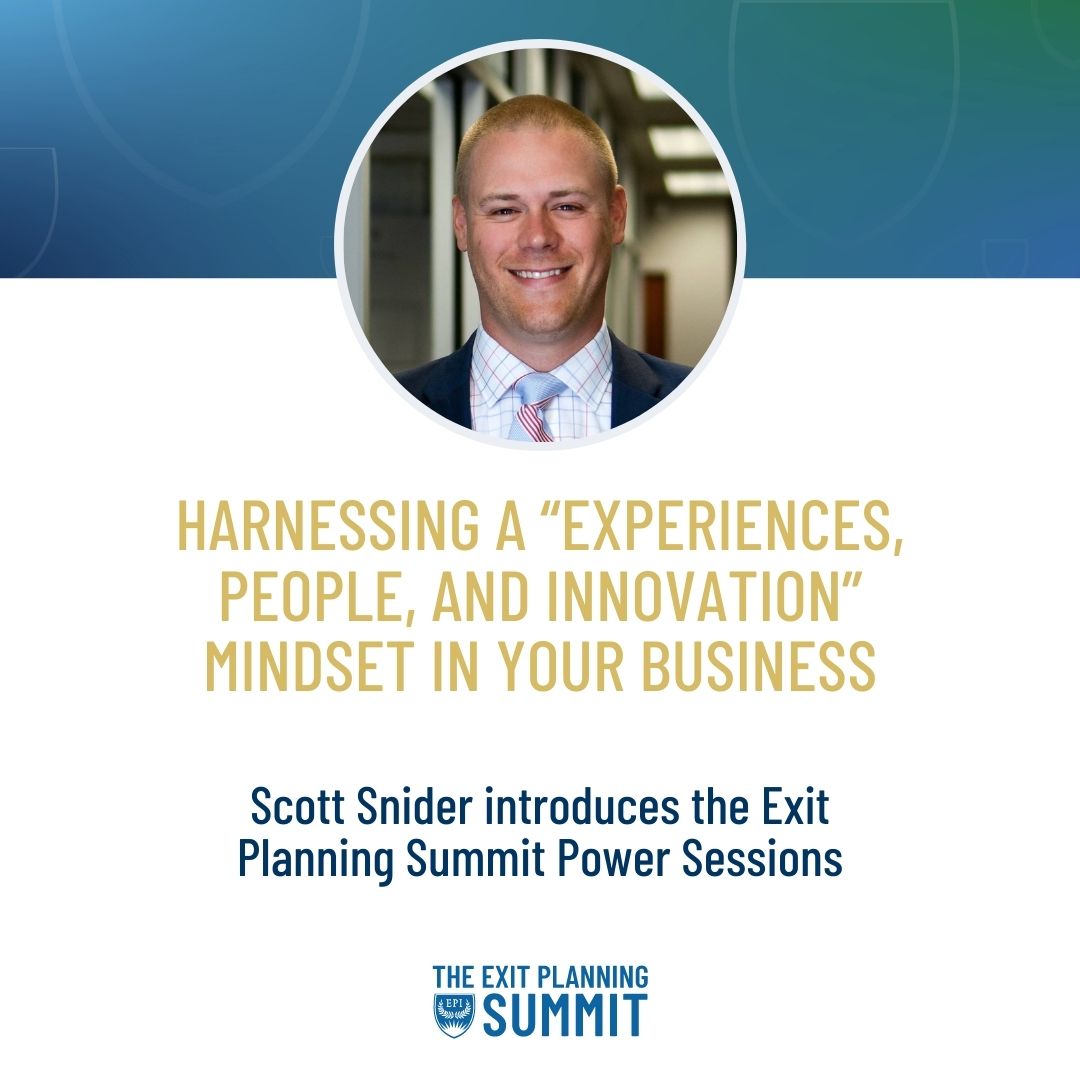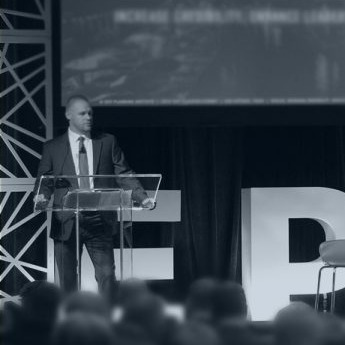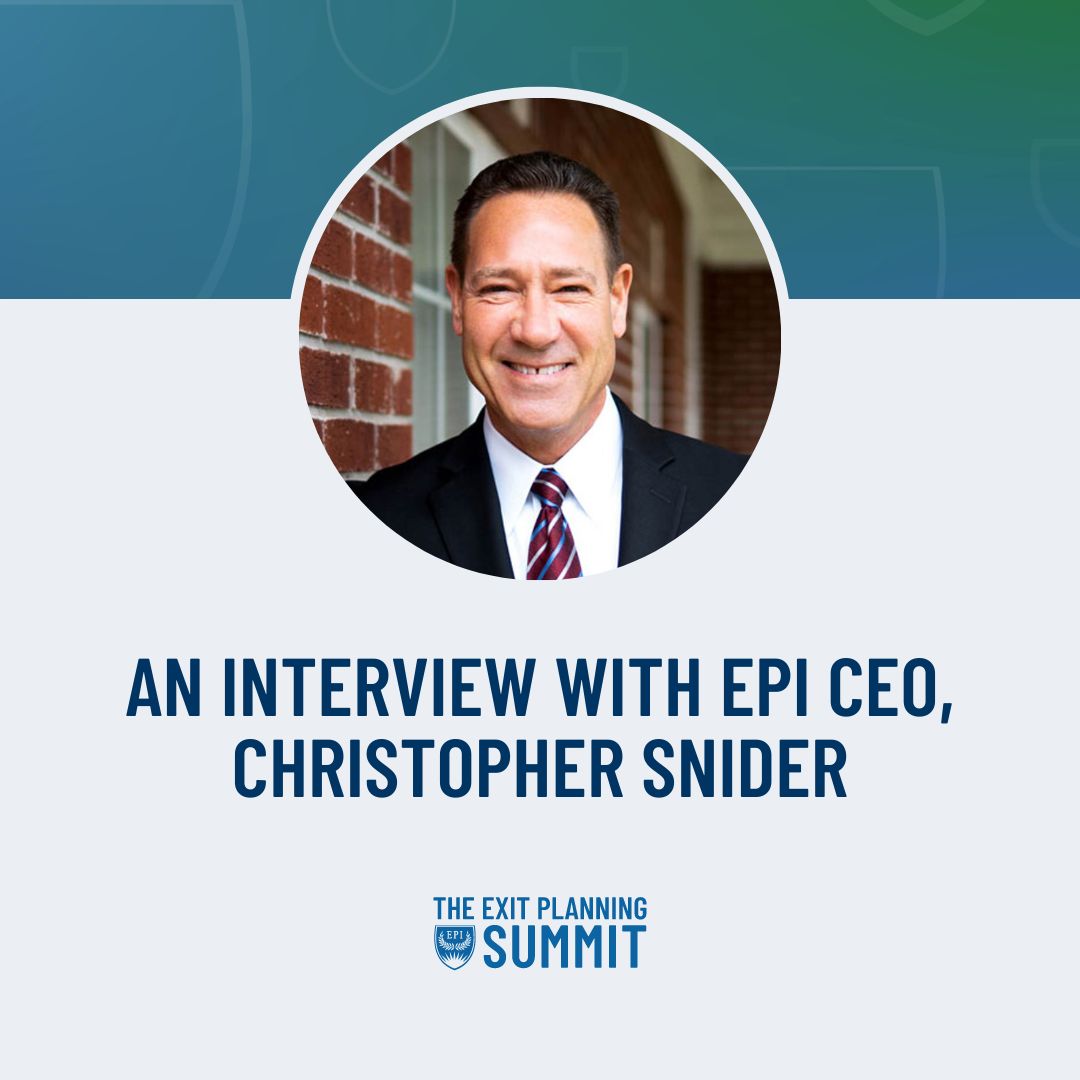
THE EXIT PLANNING BLOG
Keep up-to-date with exit planning, succession planning, industry trends, unique specialty insights, and useful content for professional advisors and business owners.
Share this
Celebrating 10 Years Since EPI was Acquired by Snider Premier Growth
by Paige Wysocki on February 18, 2022
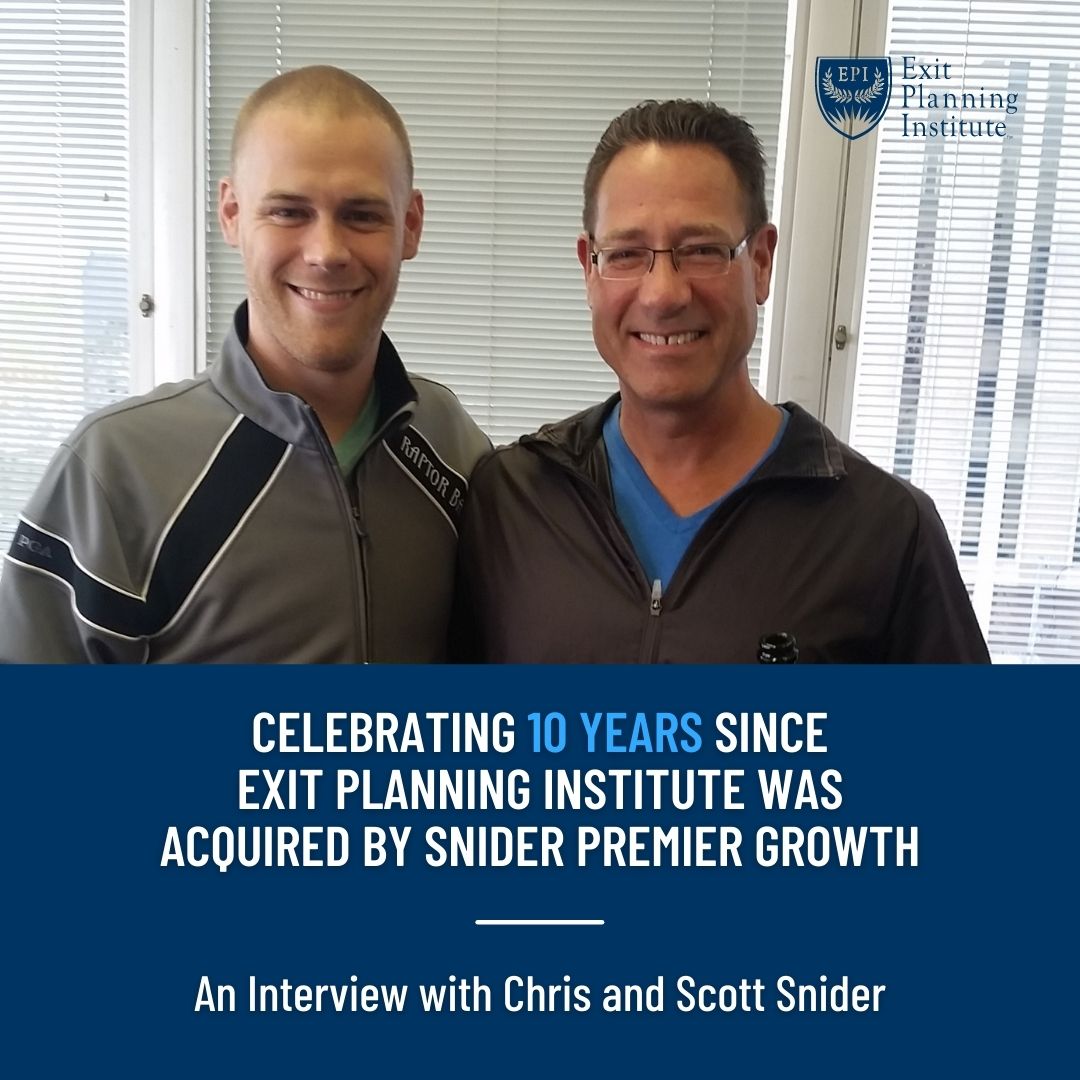
The Exit Planning Institute was founded in 2005 by Peter Christman and Richard Jackim as a professional education organization to provide the tools and resources for advisors involved in the exit and succession planning profession. In 2012, Christman and Jackim went through an exit of their own, and EPI was acquired by the father and son team of Chris and Scott Snider. Combining their vast experience in rapidly growing business value and their shared passion for education and helping business owners successfully transition, Chris and Scott purchased EPI in late 2012 through their small family office investment company, Snider Premier Growth.
This year, we celebrate 10 years of the Snider family’s ownership of EPI. We spoke with CEO, Chris Snider, and President, Scott Snider about the past 10 years, how exit planning has directly impacted their business, and what the next 10 years look like for EPI.
Click the drop-downs under each question to read more from both Chris and Scott!
What lead to your decision to acquire Exit Planning Institute in 2012?
Chris' Response:
In the spring of 2008 a friend of mine forwarded me an email he received from a group called the Exit Planning Institute promoting EPI’s CEPA program. The timing was perfect. Just two years prior I launched my consulting company. Although I had been successfully helping my clients grow and sell their businesses, something in my practice was missing. Our program helped our clients grow their businesses and eventually come into a lot of money. But despite that, a year later they didn’t seem happy. In researching EPI, I learned about the Three Legs of the Stool – a concept created by Peter Christman and taught at EPI’s CEPA program. A light bulb went off. In my work with clients, I thought, our firm is only addressing one of the three legs of the stool. We were only focusing on business value growth and value realization. I was intrigued and decided to attend the CEPA program in November 2008. I was the 93rd CEPA.
In 2010, Pete and Rich called and asked me if I was interested in a seat on the Board of Governors which I immediately accepted. I suggested that we needed to host a national conference annually and develop local chapters. We launched the first EPI chapter kick-off event in Cleveland in May 2011. In addition to launching the chapter, we created a chapter guide to be able to show others how we did it. We anticipated it would be successful and once we proved that we figured other CEPAs would be interested.
2011, Pete called to say he and Rich were considering selling and asked if I would be interested in buying EPI. I approached my son to ask what he thought. He knew how passionate I was about EPI. He simply said, “buy it.” I called Rich and told him I can just do this deal on my own, no partners, and close in 60 days. Sixty days later we were the new owners of EPI.

Chris and I have always shared a couple of similar passions. We have always loved being entrepreneurs and growing companies. Additionally, we have always loved to help other business owners do that for their companies and help to position them for an exit. I entered Chris’s consulting and M&A practice after I sold my company in 2010. Chris had a very unique model. At the time it was called BIGS, Buy, Improve, Grow, and Sale. He had become a CEPA in 2008 and applied the concepts he learned from EPI through his consulting firm. In 2011, Chris and I evolved BIGS into what is now called the Value Acceleration Methodology.
We also became very involved in EPI as it was a strategy for us to grow our own firm and network with other like-minded advisors who represented expertise we didn’t have. Then, the founders of EPI, Pete Christman and Rich Jackim, put EPI up for sale. After what I believed a couple of failed attempts on the market, they approached their more active members. Remember there were only about 180 CEPAs at the time. When I saw that opportunity, I told Chris we needed to make a move and buy it. I thought that we could flip the model. If we could take his methodology and instead of teaching it to owners, we taught it to the professional advisor we could have a bigger impact on our overall purpose and passion: to help business owners grow value and exit. So, we made the move, and in 2012 purchased EPI.
How have you seen the exit planning profession change in the past 10 years?
Chris' Response:
Exit planning wasn’t even a real profession in 2012. EPI only had 180 members when we bought it. I had the advantage of being a member of EPI for four years before we bought it. What I saw was a lot of disparate practices and disciplines. No common language. No common proven process. Little to no collaboration. No community. But I just kept thinking about the possibilities if we could bring this industry together. Our community of CEPAs could be a force that could change the lives of business owners and their families across the country and maybe even the world. And business owners needed exit planning badly. We knew that. One of the things I am most proud of is that today exit planning is mainstream. It’s a profession. It’s an industry. When you look at the collective talent and intellectual power of our members today, they are a force that preserves what for many business owners is their life’s work and that changes people’s lives in a big way.

There has been a total evolution of a profession and approach. Prior to 2012, EPI was teaching concepts. Great concepts. But from what I could see, the advisors coming out of the program didn’t really know how to apply those concepts and business owners didn’t understand how effective they were. There was no process. The Value Acceleration Methodology brought a process that was executable and results-driven. It put exit planning into action.
This brought what I feel are three significant changes.
1. It brought exit planning from something a business owner and the professional advisory team would do in the future, when it was “time” to prepare for the exit, to something you incorporate right now into what you do. Why? Because exit strategy is business strategy.
2. It brought people together and built a community. The new methodology showed a clear place for all advisors and for advisors to get involved earlier on in the exit journey. It brought teams together around one common goal and organizing principle.
3. One of the most recent, but biggest, changes is we have seen owners start to adopt this methodology and have success. The baby boomers are exiting, while the younger generations are learning an entirely new way to operate the business, grow value, while aligning their business, personal, and financial goals and giving them some freedom back or work-life balance.
How has the Certified Exit Planning Advisor credential impacted the exit planning industry?
Chris' Response:
Our initial strategy after purchasing EPI was built around several pillars. Implementing these pillars would establish EPI and define the industry.
The first thing we needed was to change the paradigm of how people viewed exit planning starting with business advisors. We needed to re-educate the advisors about what exit planning really is. What I saw is that many of the advisors were giving owners the wrong advice. We needed people to stop thinking that exit planning was done at the end when you “think” you are ready to exit. In the case of many financial advisors and estate planners, they were not even learning about the exit until AFTER the exit. Exit Planning is what you do every day in your business and your life that determines a successful exit. We needed to start thinking about exit planning as present tense. We came up with the mantra “Exit planning is business strategy” to help solidify this idea into people’s brains and change their paradigm.
The industry needed a process and a common language. There were some materials about exit planning at the time. But no one actually explained how to integrate it into what you do every day. Using the Value Acceleration Methodology could not only position your business and yourself to exit, but drive more wealth, sales, profits, and value today!
We needed a new mission statement which became “Change the Outcome.” Simple and straightforward. We needed to convince owners that with proper and holistic planning and action you could actually change your outcome. In fact, you could position yourself for multiple types of exits and control your destiny. A successful exit is predictable and intentional if you do the right things along the way.
We needed to make exit planning a market force. One aspect of that was to roll out chapters across the country. Every community is unique. We had a core methodology, but it needed to be localized and owned by each unique community. This enabled many CEPAs to get engaged in the mission.
To further the community, we needed to host a national conference where CEPAs could share and leverage their knowledge, build relationships, and could have some fun together. The first conference after we purchased EPI was held in Cleveland to symbolize EPI’s new headquarters. In fact, EPI’s conference in 2011 was one of the first five conferences hosted in Cleveland’s brand new convention center.
Finally, we needed to base our work on hard facts about the needs of business owners and share that with members and the greater community. This started when a local group in Cleveland approached our NEO chapter and asked if we could develop a curriculum to educate their 17,000 business members. So, the EPI Northeast Ohio chapter decided to launch a study to determine their state of readiness. We officially commissioned the first State of Owner Readiness study in 2013. We decided to launch a one-day ownership symposium to invite owners to short sessions on exit planning topics and released the results of the initial study there. Other chapters heard about what we were doing and expressed interest. We have been doing studies on the state of owner readiness ever since.

I think CEPAs are the true pioneers of our entire profession and market. Armed with the process, the support from EPI, and the community, we have grown from 120 CEPAs in 2012 to over 3,000 CEPAs today. CEPAs today are the authorities in exit planning and come with a team mentality and believe in aligning the owner’s business, personal and financial goals.
Chris, as a CEPA, how has the community created in the EPI network enhanced your advisory practice?
Chris' Response:
Integrating what I learned at CEPA into our consulting practice combined with the launch of the Northeast Ohio chapter put Aspire Management on the map. No one was talking about this let alone had a holistic process for how to do it well. People were very intrigued. Soon after we launched the chapter I was in the press 13 times over a 12-month period. At the time, most advisors were just focusing on their piece of the model. Few had a practice that addressed the whole process. EPI provided a platform for my voice and for other advisors. The chapter provided a vehicle to collaborate and learn from each other. If you open your eyes, you will meet some really smart people out there. The chapter was a catalyst for that. We started working together and approaching clients in a more holistic way – as close to seamless as you can get I think. This dramatically improved the experience for business owners and enhanced all our practices.
Chris, you chaired the very first Exit Planning Summit in 2011, then called the EPI International Conference. What has changed in our conferences since that inaugural event?
Chris' Response:
With the help and support of NACVA, I chaired the first national conference, which was held in Fort Lauderdale in November 2011. We had 50 people attend. It’s funny now because it’s night and day. In the beginning, we were just trying to bring the community together. The early conferences were very typical with one presentation after the other. Today, we have a community, and everyone participates and provides input. Today we have socializing, a charity event, Power Sessions, really intriguing speakers, exit planning awards, group casework, and of course CEPA Feud! It’s really a much more robust experience and I think we all have a lot of fun.
When you think about the collective intellectual power of our members it’s stunning. Our community represents the best and brightest and some of the coolest, most well-regarded firms in the market. I remember when this first hit me. It was at the Summit when we first introduced the Power Sessions – in 2018 I think. I remember it well because it was the first conference where I didn’t have to do much and so I was able to socialize quite a bit with the members for the first time. Normally I would be running from one session to the next. As I sat and listened to the speakers at the Power Sessions, I was blown away at how talented they were. Their points of view were very motivating. I remember sitting and looking across the room at all the attendees and thinking, we have a community now! It was a very proud yet humbling moment for me. You know, you pour your heart and soul into these things. It’s a wonderful moment when you see it come together.
What are you both looking forward to in the next 10 years of EPI?
Chris' Response:
I think the biggest thing is that the owner dynamic is changing. Everything we said about the baby boomers transitioning is finally happening. Today’s owners are more educated, savvier about exit planning and its benefits. They see the value of exit planning. Think about it, ten years ago the average boomer was 57 years old. Today the average boomer is 67. Ten years ago, baby boomers owned almost two-thirds of the privately held businesses. Today they own just over half. The aging boomer transition is well underway, just like we said it would, and we are seeing the economic and social consequences of that big generational shift.
Our 2022 New York City State of Owner Readiness survey showed a much younger age for the average owner and that many of the concepts we teach had been integrated into their businesses and lives. These next two generations are a combined 120 million and more entrepreneurial than ever. They are now a much greater force shaping our economics and social values. Our community, what we teach, the way we teach, and how we advise, needs to shift to make sure we align with them.

Seeing the next evolution of the methodology and continued impact and growth of the Certified Exit Planning Advisor. We have a real opportunity here to have a massive impact on business owners. By doing that, we indirectly have a much larger opportunity to be impactful to our countries, communities, employees, customers, and all things that come from having great small to lower middle markets. Over the next 10 years, we will see many of the baby boomer business owners exit, then we will see the next two generations begin to operate companies differently than ever before. They will be focused on value creation, not just income creation. With that mindset, it impacts all things.
As a father/son team, what would you say to other family businesses looking to achieve a decade of success?
Chris' Response:
Scott and I have been working together since he was 17 years old. It was one of the primary reasons I left the big corporate world to start my own family business. I wanted to start a family business with Scott. There is absolutely no way I could have accomplished what I have accomplished without him by my side. He is a great partner and son and I am truly grateful.
Never forget it should always be family first. Your family is much more important you’re your business although, in reality, it is almost impossible to separate them. Make a lot of emotional deposits. If you do, those emotional deposits, although they may get drained every now and then, sometimes really drained, will carry you through the difficult times. And there will be difficult times. Remember the whole family is affected even if they are not in the business.
You also need structure. Run the family business as a business – not a piggy bank. And ensure the future generations are earning/buying their way in. I believe you need to make them work for it. Don’t just give it to them. Otherwise, they just don’t get the pain, the risk, the energy it takes to develop a business.
It’s hard to step aside and let the next generation take over – really hard. Make sure they are getting the right training and experience. It is wrong to just throw it on them without properly preparing them. That takes years to accomplish. Make sure you respect their style and points of view even if it isn’t your style or your exact point of view. They need room to express their own voice and take ownership. Give people “room to bloom” I like to say.

I would point to probably four things that have made us a great team.
1. We had a great relationship coming into being business partners. That great relationship, primarily outside of business though Dad and I have done business together since I was probably 15 years old and started my first company, set a good foundation of communication, respect, and frankly fun. If you don’t have a great relationship with your parents or your kids. Simply don’t do business with them.
2. We know how to communicate, and we do so often and honestly. Communication is probably the hardest thing to do. So we also practice, use tools, and use advisors to help bring third-party insights. An effective tool we have used recently is The Family Business Blueprint. A tool from Tom Dean’s book Every Family’s Business.
3. We have structure. From a business perspective, we utilize the Value Acceleration Methodology to bring a framework to what we do, develop clear goals and metrics, create a strategy, build core values, and drive purpose forward. At the end of the day, we know what success means, and it is clear. We either hit the goals or didn’t.
4. We know that family is first. We don’t let our business take over our lives and try not to bring it to the dinner table. We know that our business impacts our family positively but sometimes negatively. And if Chris and I are on bad terms the family also feels it. At the end of the day, if the business is destroying our relationship as father and son, we know it’s time to exit the business.
How have you incorporated exit planning into your business and personal lives?
Chris' Response:
We don’t just talk about it. We live it. I believe it has been a critical driver to our business success over the last 10 years. In addition to using the core Value Acceleration Methodology process, we have a healthy professional development budget and have brought in outside advisors, including several CEPAs, to help us with our business.
Over the last couple of years, as I approach my own eventual exit, I have shifted more attention to the personal and personal financial aspects of my exit plan. You know, I have helped many business owners over the years with this. But now for the first time, I am facing my own exit. It’s different when it is you. I have come to know first-hand how challenging the personal, personal financial, family, and health aspects of exit planning can be and the importance of a personal advisory team. I also realized the importance of developing a successor to operate the business. You need a successor to continue to man the details of the business to pull yourself away from the business enough to be able to work on your personal planning.
It is very hard to find the time to be able to complete all the personal aspects and get yourself ready. It takes a lot of effort, time, and money and it can feel overwhelming at times. All of this points to what we say all the time – you cannot wait until the last minute. Rather, you need time, years, in fact, to do it right.

We live it deeply. I personally believe when someone asks, can you show me an example of or a case study of a business owner who implemented Value Acceleration Methodology, my response is you’re looking at one. I have had the benefit of being exposed to this process since I was 15 years old. If I ever wrote a book it would be something to the tune of, growing up through Value Acceleration. We live it our business and personal lives and now our employees live it as well. It has allowed us to pivot successfully during a pandemic, have a great father-son relationship while aggressively growing a company, it has allowed us to attract and retain great people, work with great customers, and give us a work-life balance. We literally do everything that Walking to Destiny says to do.
Chris, you literally wrote the book on Value Acceleration, how have you seen the exit planning profession grow as a result?
Chris' Response:
I felt the $10 Trillion Opportunity did a good job of explaining all the components of exit planning. But a lot of business books leave you hanging as to how to actually go out a do it. I also felt like we needed something which crystalized what really drives value and the dynamics of actually executing the plan.
A plan with no action does not change the outcome. Exit planning is a complicated, multi-year, emotional, expensive journey. It involves a lot of people: advisors, family, employees, partners, customers, suppliers, and your community, with the owner at the center. This makes it even more complicated. I would like to think our members now understand the big picture and how they fit into the overall process. And I would like to think that because they are all working from the same playbook, they deliver better results for the clients they serve.
Is there anything you would like to say to the exit planning community?
Chris' Response:
Simply, thank you! I am grateful and lucky to have you. The best part of this journey has been the people I have met and worked with on this journey. Thank you for having faith in the process, in EPI, in our vision, and in me personally, as the leader of our community over the last 10 years.
I would like in particular to thank those early pioneers that set out on this journey when EPI had less than 200 members, then 500, then 1,000, and now 3,000. People like Peter Christman and Scott Miller, who took me under their wings. Sean Hutchinson who I met at CEPA in 2008. Sean is one of the smartest people I know and someone who is not afraid to tell you what you need to hear, not just what you want to hear. He has not only has been my friend but also a close advisor to me since we met at CEPA in 2008. We have in effect, shared this journey together. And now he is providing the same great counsel and friendship to Scott. Pat O’Brien of PNC was my first Executive VP of the NEO chapter and led the first State of Owner Readiness study. Amy Wirtz for all the personal counsel and hours of her time she graciously provided me and our family. Thank you all. And finally, Mike Trabert and Ken Haffey who I have worked with very closely on client engagements. I would come up with an idea and Ken and Mike would say let’s try it out. Many of my original ideas were tested with them.
I like to thank my personal advisory team, in particular Kurt Walcutt and Hal Maxfield, who have been my friends and advisors since I launched my very first company. They have done things to help just because I asked. The first chapter board was formed that way. When I asked them to help me launch the first chapter, most were not CEPAs and had nothing to do with EPI. I remember asking them to just do it for me…and they did. Hal did the legal work and Kurt did the finances and they still do today.
Thank you to our faculty who have helped and continue to help develop the curriculum and donate so much time to the community. Some members of the faculty taught CEPA before we even owned it. Many have been with us for the full 10 years. And our chapter presidents who take these ideas local while helping us build an international brand.
I would also like to thank our employees. This group we have today stuck with EPI during the COVID crisis, the most challenging time in our company’s history in ways even beyond COVID. They have helped re-invent a better, stronger, and more dynamic EPI and CEPA. In particular, Josh Koza has been with us almost from the beginning when we had four people including Scott and I. Josh and I still have a laugh about the time when Scott and I suggested at one of our early strategy retreats that we wanted to get to the point where we were onboarding 400 CEPAs in one year. Hearing this, Josh’s eyes bugged out. He thought that was impossible as we had only onboarded 100 the year before. Jesse Hudson has been with us almost from the beginning. Jesse brought a professional approach to business development. He has been a loyal friend to Scott and our family for many years. He is quite polished today, but I knew him when he was pretty rough around the edges. Both he and Josh took a risk and left much bigger companies to work in our little family business.
I would to thank some of our biggest customers for recognizing CEPA. Their approval helped solidify CEPA as a regarded credential. In particular, I would like to thank James Jack from UBS. UBS was the first large institutional firm to recognize CEPA and get behind exit planning. UBS was an early adopter. James moved over from another position at UBS to lead this initiative within UBS. You don’t really know how solid your relationship is or the character of a person until you face a crisis together. James and UBS have been wonderful partners and I believe their work has had a lasting influence on the entire financial services industry. I honestly cannot think of a better example of a more aligned partner who backs up his commitment to the word “partnership” when push comes to shove.
And finally, thank you to our strategic partners, past and present, some of which have been with us since we purchased EPI. Peter Hickey from MAUS and John Warrillow from Value Builder come to mind. EPI was one of John’s first customers as he rolled out his new model for building value. Peter Hickey and I spend countless hours discussing the methodology and designing solutions.
I am sure I left someone out. If you are that person I am sorry and I am still grateful and value our relationship.
It has been a wonderful roller coaster ride. I would not trade it for the world – priceless as they say.

To the exit planning community overall, I would say the time has come. Looking at the statistics and the trends the baby boomers have now hit the age where they are actively looking to sell. Also per research, we have seen the next two generations more open to exit planning concepts and processes and we have the opportunity to change the way they are doing business and help them grow and exit. To CEPAs, stay passionate and pioneering. Know that if we can drive transformational experiences for owners and advisors, if we can build great teams through attracting and working with great people, and we can continue to lead through innovation and creativity we will lead this entire profession forward and create a great impact on each other and business owners. Lastly, I would say thank you for an amazing 10 years.
As a younger owner, I have a deep appreciation for our founders, Peter Christman and Rich Jackim, who shaped the foundation of exit planning. I am inspired and grateful that my Dad, Chris, took the leap, created the methodology, and pivoted from working with owners to working with advisors. And as a business owner, I am deeply grateful as his methodology has impacted my life inside and outside of business forever.
Thank you to our CEPAs who continue to keep the momentum and drive the industry. And thank you to my team. Undoubtedly the most creative and passionate people I have surrounded myself with ever. Specifically, I’d like to thank our longest-tenured employee, Josh Koza. He also took a leap of faith when we had about 3 employees, and he left his nice more corporate job in logistics, to become the typical entrepreneurial jack of all trades and my right-hand man here at EPI. To everyone, I look forward to the next 10 years and the massive impact we will have!
Attend our 10th Anniversary Webinar on March 18 at 1 PM ET to hear more about the evolution of EPI from Chris and Scott Snider. Join in as Chris and Scott elaborate on their journey with Exit Planning Institute so far and highlight what’s to come for the exit planning industry.
Register for the 10th Anniversary webinar here.
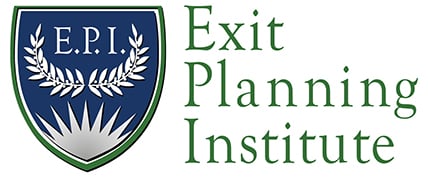
More than a credentialing company.
"This Methodology is Going to Supercharge My Practice!" -Justin Goodbread, CEPA, CFP®
Official ‘Exit Planning’ Definition: Exit planning combines the plan, concept, effort, and process into a clear, simple strategy to build a business that is transferable through strong human, structural, customer, and social capital. The future of the business owner, his/her family, and the business itself are addressed by exit planning through creating value today.
Exit planning is not just a plan (or a keyed-in report to print out for an owner). It is a strategy rooted in execution that grows value while expanding options so that an owner can transition the business on his/her terms when they are ready. It aligns the business, personal, and financial needs of the owner. Good exit planning utilizes the Value Acceleration Methodology™ to move clients through discovery, prepare, and decide gates. Certified Exit Planning Advisors (CEPA) educate the owner on all of the exit options and enters an engagement with an exit-option-agnostic perspective as to truly serve the business owner’s diverse needs. CEPAs collaborate with a seasoned, multi-disciplinary team of professionals to support the success of the business owner and use each other’s specialties and expertise to the benefit of the project. [view the award-winning methodology]
"Why did I earn CEPA when I already had an exit planning designation? Simple, the network. The quality of the EPI advisor network is unmatched." -Paul Meyer, CEPA, CBEC
Do you consider your COIs or your referral network as the #1 source for new business? Look no further for your next membership affiliation. Formed in 2005 to serve educational and resource needs of financial planners and wealth managers, CPA/accountants, attorneys, commercial lenders, M&A advisors and business brokers, management consultants and other business advisors, the Exit Planning Institute is considered the standard trendsetter in the field of exit planning across the globe. It is the only organization that offers the Certified Exit Planning Advisor Program (CEPA) and qualifies for continuing education credits with twelve major professional associations, making it the most widely accepted and endorsed professional exit planning program in the world. [find a CEPA in your area]
"As a CPA, nothing is more important than exit planning." -Bill Kenedy, CPA/ABV, CFF, CEPA
Our founders paved the way for the organization we are today. In the past three years alone, EPI has grown by more than ten times. We support and enable thousands of professional advisors who are leading the way in their local marketplaces across the globe. We invite you to join the community and experience the EPI difference.
We are powered by a dedicated staff, industry experts, and market leaders, that are passionate about providing top professional advisors the best industry content, ongoing practice support, and owner education resources. From humble beginnings, EPI has grown to become the exit planning market leader while staying focused and true to our mission. We are an education company that certifies and supports more than 900 CEPAs (and counting) as well as thousands of advisors worldwide through national, regional, chapter, and virtual education. Explore our history and make plans to play a part in our future. [explore the EPI history timeline snapshot]
"You want to have the best credential in the industry. So my advice is that you have to go with Exit Planning Institute." -Vincent Mastrovito, CEPA, CBEC
Do you want help in an increasingly commoditized or oversaturated marketplace? Do you want just another designation for your business card or do you want the credentialing education that helps you adapt and thrive in a rapidly changing industry? You've come to the right place.
The Exit Planning Institute creates an exit planning “ecosystem,” and due to the diverse nature of exit planning, EPI has fostered a hyper-engaged exit planning community. This community includes CEPAs, other collaborative advisors, strategic alliance partners, academicians, the media, and business owners from across the globe made up of 15 countries, 44 U.S. States and representing over a dozen different professional disciplines. To serve this elite and cross-functional community on one major platform, EPI produces the best content as it relates to exit planning, succession planning, and value acceleration, provides ongoing advisor support and practice development, and creates connectivity to transitioning business owners. [connect with us today]
Explore the unmatched professional development experience and gain your next competitive edge in 2022.
The Certified Exit Planning Advisor (CEPA) Program is the most widely endorsed and accepted exit planning designation in the marketplace today. Experience the EPI difference and determine if earning the CEPA designation is the next strategic move for you to reinvent yourself in a changing marketplace. Visit www.EarnCEPA.com today.
Share this
- Blog (550)
- CEPA (433)
- exit planning (249)
- CEPA community (189)
- Business Owner (176)
- Exit Planning Summit (100)
- EPI Chapter Network (89)
- Value Acceleration Methodology (81)
- Exit Planning Partner Network (76)
- EPI Announcement (50)
- Content (48)
- Webinars (37)
- Excellence in Exit Planning Awards (34)
- Marketing (30)
- 2024 Exit Planning Summit (28)
- 5 Stages of Value Maturity (26)
- Books (24)
- EPI Academy (24)
- EPI Team (22)
- Exit Planning Teams (22)
- Leadership (21)
- 2023 Exit Planning Summit (20)
- family business (20)
- women in business (19)
- Intangible Capital (18)
- Exit Options (17)
- Black Friday (16)
- CPA (15)
- Walking to Destiny (15)
- Chapters (14)
- State of Owner Readiness (14)
- charitable intent (13)
- Chris Snider (12)
- National Accounts (12)
- Small business (12)
- personal planning (12)
- Financial Advisors (11)
- Season of Deals (9)
- 5 Ds (8)
- About us (8)
- Podcast (8)
- Scott Snider (8)
- Insiders Bash (7)
- Christmas (6)
- Exit Planning Content Library (6)
- Case Studies (5)
- Owner Roundtables (5)
- Three Legs of the Stool (5)
- Value Advisors (5)
- financial planning (5)
- Awards (4)
- Circle of Excellence (4)
- DriveValue (4)
- EPI Thought Leadership Council (4)
- Exit & Succession (4)
- Five Ds (4)
- executive training (4)
- Owners Forum (3)
- author (3)
- forbes (3)
- Exit Is Now Podcast (2)
- Peter Christman (2)
- Veteran (2)
- Whitepapers (2)
- Annual Exit (1)
- Business Owners Forum (1)
- SOOR (1)
- business consultants (1)





